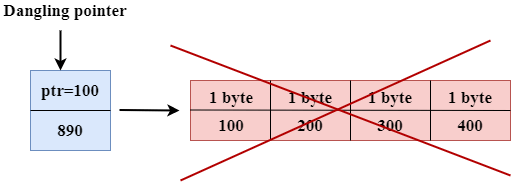Dangling Pointers in C
The most common bugs related to pointers and memory management is dangling/wild pointers. Sometimes the programmer fails to initialize the pointer with a valid address, then this type of initialized pointer is known as a dangling pointer in C.
Dangling pointers in C are pointers that still hold the memory address of a previously deallocated or freed object. Accessing such pointers can lead to undefined behavior and can be a source of serious bugs in C programs. Dangling pointers can occur in several ways, including:
1. Returning a pointer to a local variable: When a function returns a pointer to a local variable that was declared within the function, the pointer becomes dangling as soon as the function exits because the local variable's memory is no longer valid.
2. Freeing memory and continuing to use the pointer: After using free() to deallocate memory, if you continue to use the pointer that previously pointed to that memory location, it becomes a dangling pointer.
3. Double Free: Freeing the same memory location more than once can result in a dangling pointer.
4. Pointer arithmetic: If you manipulate a pointer to point to a location that is outside the valid memory range, it can become dangling.
Let's observe the following examples.
Let's understand the dangling pointer through some C programs.
Using free() function to de-allocate the memory.
Using the free() function to deallocate memory. This is a common source of dangling pointers if you continue to use a pointer after the memory it points to has been freed.
c#include <stdio.h>
#include <stdlib.h>
int main() {
int *ptr = (int *)malloc(sizeof(int)); // Allocate memory
if (ptr != NULL) {
*ptr = 42; // Store a value in the allocated memory
printf("Value stored in allocated memory: %d\n", *ptr);
free(ptr); // Free the memory
// 'ptr' is now a dangling pointer
// Attempting to access the dangling pointer
printf("Dangling Pointer Value: %d\n", *ptr); // Undefined behavior
// Attempting to modify the dangling pointer
*ptr = 99; // More undefined behavior
}
return 0;
}In this example:
1. We allocate memory for an integer using malloc() and store a value in that allocated memory.
2. After storing a value, we free the allocated memory using free(ptr).
Once the memory is freed, ptr becomes a dangling pointer. Attempting to access or modify the memory location it points to results in undefined behavior.
The statement int *ptr=(int *)malloc(sizeof(int)); will allocate the memory with 4 bytes shown in the:

The statement free(ptr) de-allocates the memory as shown in the below image with a cross sign, and 'ptr' pointer becomes dangling as it is pointing to the de-allocated memory.

If we assign the NULL value to the 'ptr', then 'ptr' will not point to the deleted memory. Therefore, we can say that ptr is not a dangling pointer, as shown in the below image:

Variable goes out of the scope
A variable goes out of scope in C, any pointers pointing to that variable become dangling pointers. This situation occurs when a pointer still references a local variable after the variable's scope (usually a block or a function) has ended. Here's an example to illustrate this:
c#include <stdio.h>
int *getDanglingPointer() {
int x = 42; // Local variable
return &x; // Returning a pointer to the local variable
}
int main() {
int *danglingPtr = getDanglingPointer();
// The 'x' variable is out of scope and 'danglingPtr' is now a dangling pointer
printf("Dangling Pointer Example\n");
// Attempting to access the dangling pointer
printf("Dangling Pointer Value: %d\n", *danglingPtr); // Undefined behavior
return 0;
}In this example:
1. The getDanglingPointer function returns a pointer to a local variable x.
2. After the getDanglingPointer function has returned, the local variable x goes out of scope, making the pointer danglingPtr point to memory that is no longer valid.
3. Attempting to dereference danglingPtr results in undefined behavior.
When you run this code, the output is unpredictable and may vary depending on the compiler and system, but it generally leads to undefined behavior, such as a segmentation fault or incorrect data.
In the above code, we did the following steps:
1. int *getDanglingPointer():
This function is defined to return an int pointer. Inside this function, a local variable x is declared and assigned the value 42. A pointer to x is returned.
2. In main():
a. int *danglingPtr = getDanglingPointer();: Here, you call the getDanglingPointer function, which returns a pointer to the local variable x. The pointer is stored in the b. danglingPtr variable.
b. After this point, the getDanglingPointer function has completed, and the local variable x has gone out of scope. Therefore, the pointer danglingPtr now points to memory that is no longer valid. This is where the dangling pointer issue occurs.
3. Accessing the dangling pointer:
printf("Dangling Pointer Value: %d\n", *danglingPtr);: You attempt to dereference the danglingPtr and print its value. However, because it points to a local variable that has gone out of scope, accessing it results in undefined behavior.
4. Undefined Behavior:
When you run the code, the output is unpredictable. It can vary depending on the compiler and system. You might experience a segmentation fault or get incorrect data, but there's no guaranteed outcome due to the undefined behavior caused by accessing a dangling pointer.
Function call
Now, we will see how the pointer becomes dangling when we call the function:
c#include <stdio.h>
int *getDanglingPointer() {
int x = 42; // Local variable
return &x; // Returning a pointer to the local variable
}
int main() {
int *danglingPtr = getDanglingPointer();
// The 'x' variable is out of scope, and 'danglingPtr' is now a dangling pointer
printf("Dangling Pointer Example\n");
// Attempting to access the dangling pointer
printf("Dangling Pointer Value: %d\n", *danglingPtr); // Undefined behavior
return 0;
}Output:
mathematicaDangling Pointer Example
Dangling Pointer Value: <Undefined Behavior>Please note that the specific output of the code when attempting to access the dangling pointer is undefined behavior. It can vary depending on the compiler and system, and there is no guaranteed output. You might encounter a segmentation fault, or the program might seem to work correctly, but it is not a reliable or predictable outcome due to the violation of accessing memory that has gone out of scope.
Avoiding Dangling Pointer Errors
Dangling pointer errors can lead to unpredictable and potentially harmful behavior in C programs. To avoid these errors, you can follow several best practices:
1. Nullify Pointers After Freeing Memory: After you've freed memory using free(), set the pointer to NULL. This helps ensure that you don't accidentally access or modify the memory that has been freed. For example:
cint *ptr = (int *)malloc(sizeof(int));
// Use 'ptr'
free(ptr);
ptr = NULL; // Set the pointer to NULL2. Scope Awareness: Be mindful of variable scope. Avoid returning pointers to local variables from functions if those variables will go out of scope once the function exits.
3. Dynamic Memory Allocation: When possible, use dynamic memory allocation (e.g., malloc, calloc, realloc) instead of relying on local variables. This way, you have more control over the memory's lifetime.
4. Copy Data: If you need to access data outside of the original scope, consider copying the data to a new variable or dynamic memory instead of relying on a pointer to a local variable.
5. Use Constants or Static Variables: If you need to maintain a pointer to a value that persists beyond a function's scope, use const or declare the variable as static within the function. This ensures the variable retains its value between function calls.
6. Pointer Validation: Before dereferencing a pointer, check if it is valid (i.e., not NULL). You can use conditional statements to ensure safe access. For example:
cif (ptr != NULL) {
// Access or modify data using 'ptr'
} else {
// Handle the case where the pointer is NULL (optional)
}7. Use Smart Pointers or Data Structures: In modern C and C++ development, consider using smart pointers or data structures that handle memory management, such as C++'s std::shared_ptr, which automatically manages the memory's lifetime.
8. Memory Leak Detection Tools: Utilize memory leak detection tools or static analyzers that can help identify and prevent memory issues in your code.
9. Review and Testing: Thoroughly review your code and conduct extensive testing to identify and rectify dangling pointer issues. Automated tests, static analysis tools, and code reviews can be helpful.
10. Documentation: If you pass pointers between functions and manage their memory across multiple scopes, document the ownership and responsibilities to make the code more understandable and maintainable.

.png)

.png)
.png)
.png)

0 Comments